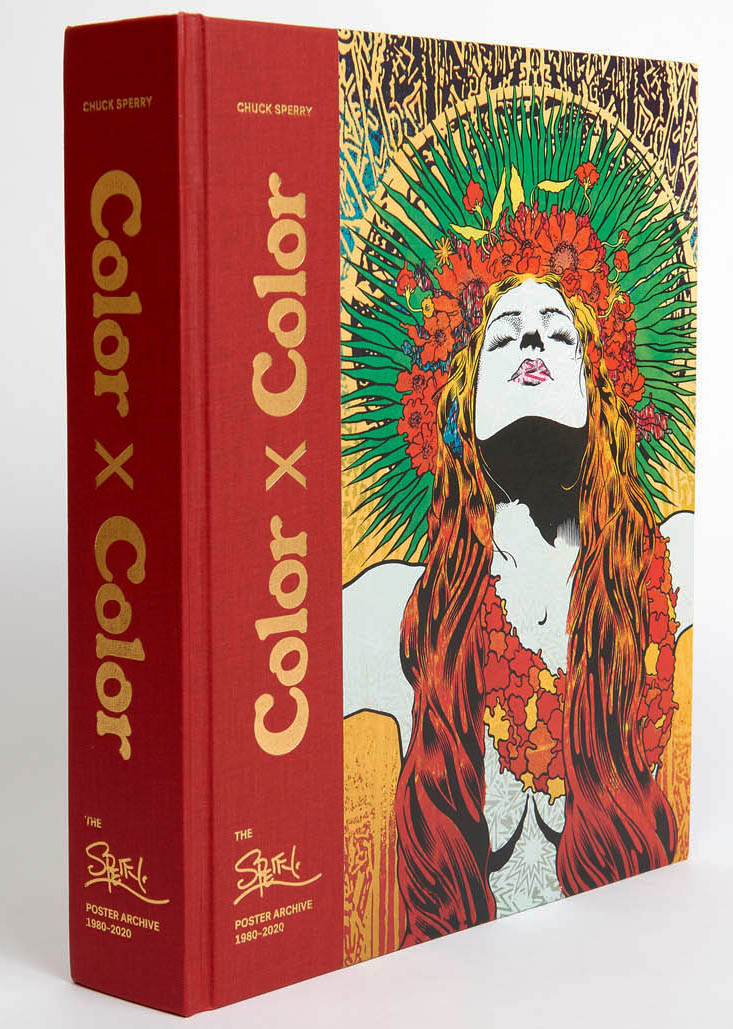I will be making a very limited release of “The Ostracon” and it’s variants, my fourth and final Jerry Garcia portrait, with a very special book signing of “Helikon” – Thursday, December 7, 2017 at 2 pm – through Spoke Art Gallery at Context Art Fair during Art Basel Miami.
Please visit us at Spoke Art Booth C133!
Read More: Sperry’s beautiful new art book, “Helikon, The Muses of Chuck Sperry” (2017)
_______________
Notes on “The Ostracon”
Ostrakon. (in ancient Greece) a potsherd, especially one used as a ballot on which the name of a person voted to be ostracized was inscribed.
“At any time, by a majority of votes written secretly upon potsherds (ostraka), the Assembly, in a quorum of six thousand members, might send into exile for ten years any man who in its judgement had become a danger to the state. In this way ambitious leaders would be stimulated to conduct themselves with circumspection and moderation, and men suspected of conspiracy could be disposed of without the law’s delay.”
— Will Durant, The Life of Greece, The Story of Civilization, Part II
While working on my book “Helikon” my work has been driven and inspired by the spirit of the ancient Greek muses and Greek mythology; Greek myths fill my art and my printmaking with theme and motif.
My creative roots are in the San Francisco poster movement which began in the utopian spirit of social experimentation in the Haight-Ashbury, where I live today. I look sometimes at my early rock poster work through be-mused glass; music was viewed as “therapy” by the Greeks. Confirmation that the ancients were well-attuned. Anyone who knows the rock concert experience as I do, knows rock fans feel this way still today.
Art for music concerts is a popular business, something with which the fine art world may be uncomfortable. In a democracy full of popular businesses, Art recently realizes it is also one. I hope my art serves as a democratizing influence in the sphere of fine art and in the culture at large.
Since the election of November 2016, I’ve refocussed on my political motivations, and I’ve aimed to make a social impact with my work. Following the popularity of my 2011 Occupy poster “This Is Our City, And We Can Shut It Down” I created a related typographic propaganda poster for the Women’s March of January 2017, “Resist Sexism, Racism, Xenophobia, Homophobia, Ignorance, Corruption and Hate.”
I made another poster which became emblematic of the March for Science of April 22, 2017.
I was pleased to see that my March for Science posters reached the lectern of the demonstration where keynote speaker Bill Nye posed with NASA astronaut Leland Melvin alongside my poster image. My Women’s March poster and my Occupy poster were recognized by inclusion in the United States Library of Congress and in exhibition at the San Francisco Museum of Modern Art. It’s sincerely gratifying to receive institutional recognition, but the pressing point is to open minds and to inspire participation in our democratic society.
Long ago as a teen I was packed off to college with Will and Ariel Durant’s eleven volume “Story of Civilization” by my enlightened parents who felt these books a necessary provision for well-rounded citizenship. I am always most drawn to volume 2, “The Life of Greece.” I re-read this book constantly.
The Will Durant passage above — which describes the ancient Greek institution of democratic ostracism — was part of my inspiration for my newest art print “The Ostracon.” His words describing ancient greek polity spark thoughts of a vibrant, if messy and flawed, democracy. Today’s news is filled with a similar vibrance and messiness: impeachment, investigations, and a series of scandalous banishments. American democracy has been going through unimaginable upheavals in the last year; ostracism is in the air.
In researching more deeply into ostracism, I encountered the words of august archeologist Professor John McK Camp II, Director of the Agora Excavations of the American School of Classical Studies at Athens and professor of classics at Randolph-Macon College in Ashland, Virginia. I contacted him to ask permission to attach his words to my art; he generously agreed. Prof. John Camp offers — in a spirit of openness and possibility — the concept of democratic ostracism as an interesting solution in this peculiar era of American democracy:
“The United States has borrowed lots from the ancient Greeks, including such bedrock items as architecture, the Olympics, coinage, theater, and, most important, the concept of democracy. Visitors to Athens can still view the official drinking cups and tableware used in the 5th century BC, when legislators were wined and dined at state expense. Not much, in fact, has changed since antiquity except the technology.
“One aspect of ancient political life has not been adopted, however, and perhaps it’s time to bring it back: ostracism. Once a year the Athenians would meet and vote on a simple question: Is anyone aiming at a tyranny, is anyone becoming a threat to the democracy? If a simple majority voted yes, then they dispersed and reassembled two months later. They brought with them their ostracon (a fragment of pottery), on which they had scratched the name of the person they thought represented a threat. The man with the most votes lost. He was exiled for 10 years, and this was thought to calm any anti-democratic leanings he might have.”
— John McK Camp II,
(From “Ostracized in Athens,” The New York Times, July 24, 2003 by permission of the author)










You must be logged in to post a comment.